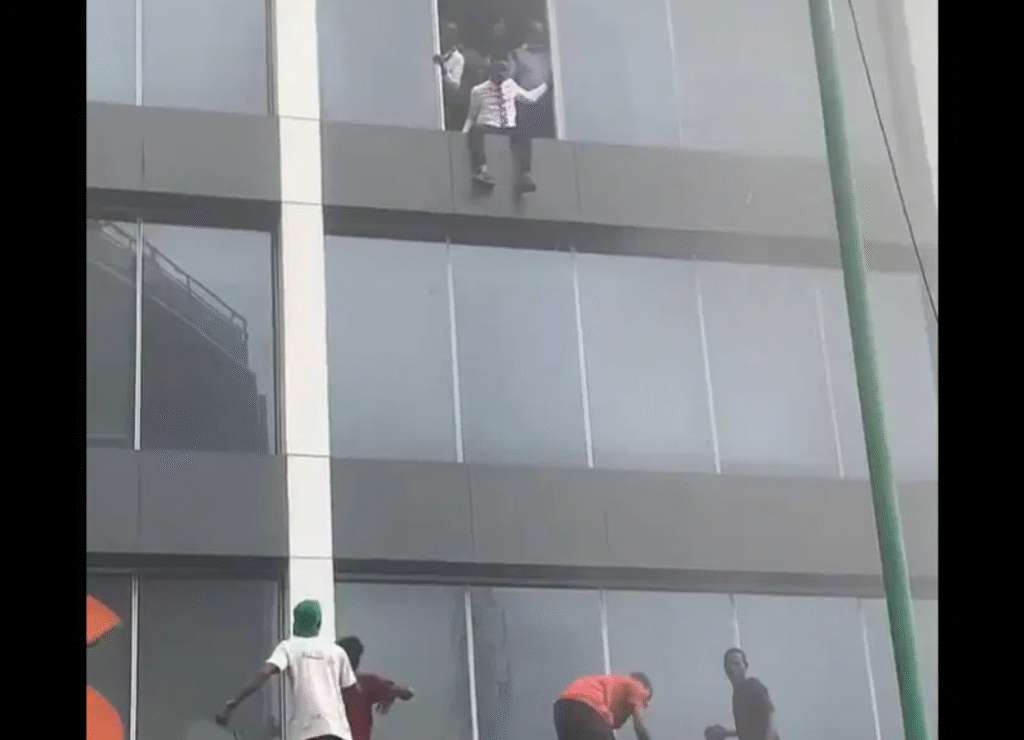
Image Credit: Vanguard Nigeria
On September 16, 2025, Broad Street on Lagos Island turned into a scene of chaos and grief. Afriland Towers — a familiar landmark for many bankers, businesspeople, and civil servants — was engulfed in flames. The fire began in the basement inverter room, but what really spread was not fire alone — it was thick, choking smoke that swept through hallways and air-conditioning ducts, cutting off escape routes.
Eyewitnesses described the scene in horror.
“The smoke was so dark, I couldn’t see my own hands,” said one survivor who works with a financial services firm in the building.
“People were shouting, some were trapped, some even jumped from the windows. It felt like a nightmare.”
Within minutes, frantic occupants were scaling ladders, smashing glass, and scrambling to safety. Firefighters and emergency responders arrived swiftly, but by then, the damage was done.
The Human Cost
The Lagos State Government has since confirmed ten lives were lost — mostly staff of the Federal Inland Revenue Service (FIRS) and United Capital Plc. Several others were injured, many from smoke inhalation rather than burns. Some who inhaled the fumes collapsed while trying to flee.
Afriland Properties, managers of the building, explained that while alarms, extinguishers, and exit staircases were in place, the smoke and heat spread so fast that many could not make use of them.
Government’s Response
In the aftermath, President Bola Tinubu, Governor Babajide Sanwo-Olu, and Lagos Speaker Mudashiru Obasa all mourned the victims. Lagos State has launched a probe into the incident and promised to tighten fire safety enforcement across the city.
Authorities also revealed that more than 200 high-rise buildings in Lagos have already been certified safe this year — but the Afriland Towers tragedy raises questions about whether compliance on paper always translates into safety in practice.
What This Means for All of Us
This fire is not just an isolated tragedy. It’s a mirror reflecting the cracks in our urban safety system. For Lagosians, here are a few takeaways:
- Smoke is Deadlier than Flames: Most victims did not burn — they suffocated. Buildings must prioritize smoke-control systems (like pressurized stairwells and smoke extractors) just as much as sprinklers.
- Fire Drills Must Be Real: In an emergency, panic is normal. But well-rehearsed fire drills, conducted regularly, can save lives by teaching people the fastest, safest ways to exit.
- Accountability Matters: It’s not enough for landlords to tick boxes for certification. They must maintain alarms, hydrants, extinguishers, and train staff. Lives depend on it.
- Every Lagosian Has a Role: Whether you work in a skyscraper, shop in a plaza, or visit an office, know your exits. Pay attention to evacuation instructions. And if something feels unsafe, speak up.
Final Reflection
Broad Street has seen its share of history — colonial trade, banking booms, independence rallies. But the Afriland Towers fire has added a painful scar. Families are grieving, survivors are shaken, and Lagos is once again forced to confront the question: How safe are we in our own buildings?
As one exhausted firefighter said after the rescue:
“We fight the fire, but Lagos must fight complacency. Safety is everyone’s business.”
The hope now is that this tragedy sparks lasting change, not just headlines. Because every Lagosian deserves to go to work in the morning with the confidence that they will return home at night.